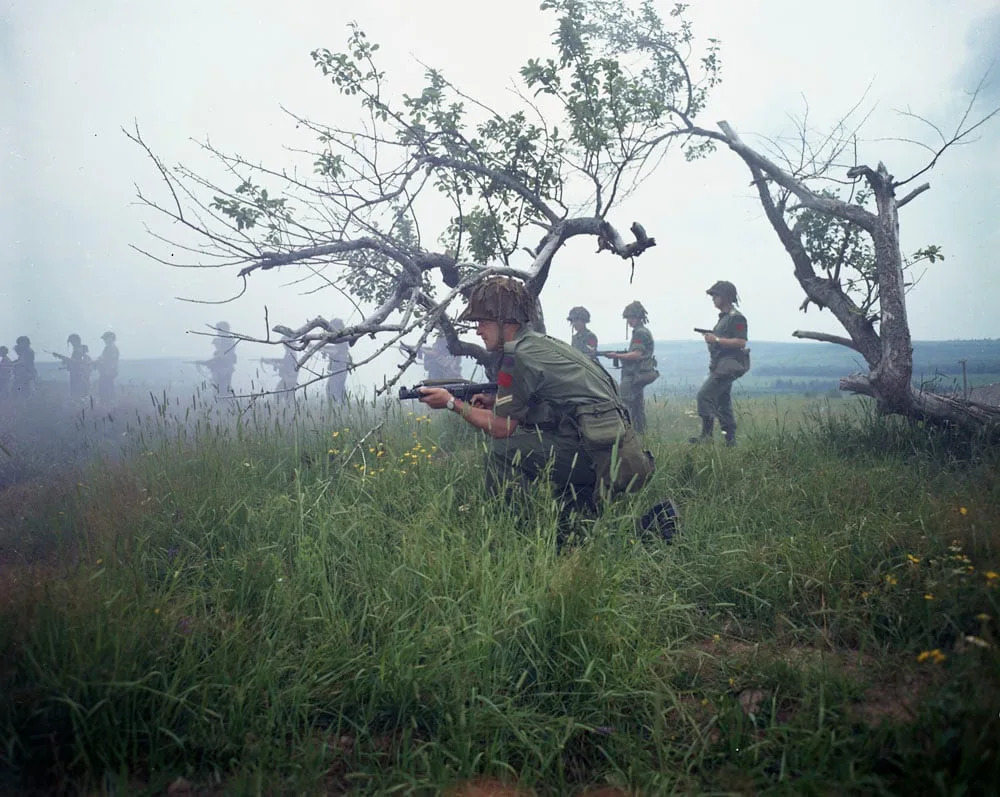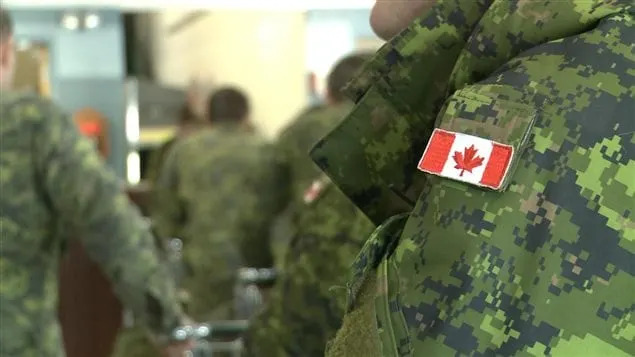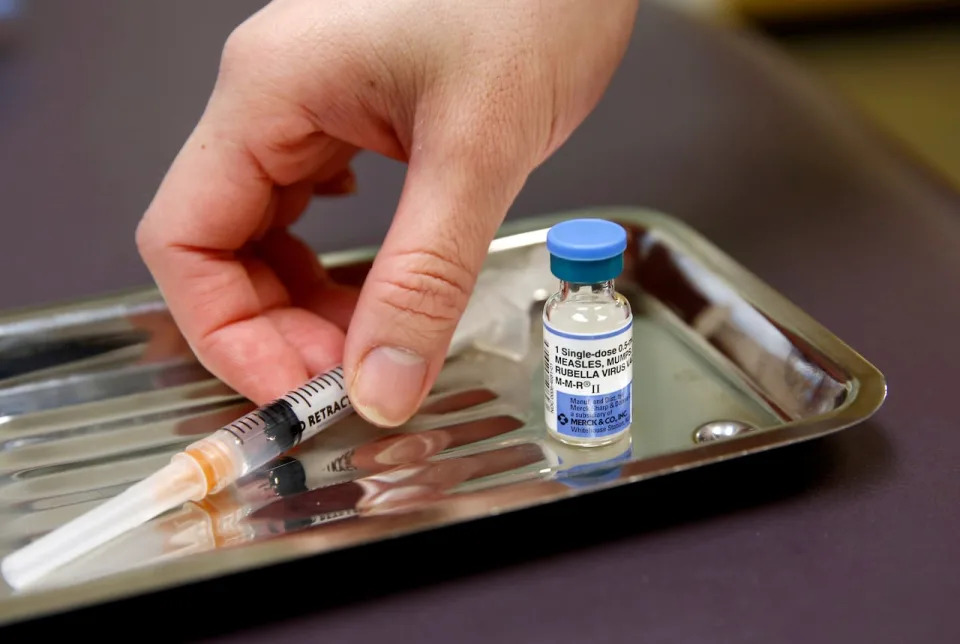Canada Surgeon general urges measles vaccine among military amid rise in cases, positive member
CBC
Sat, April 27, 2024

5th Canadian Division Support Base Gagetown in Oromocto, N.B. is the second largest military base in Canada and the largest military facility in Eastern Canada. All members of the Canadian Armed Forces have been advised to be sure they are up to date on their measles vaccines. (Library and Archives Canada - image credit)
Soldiers at Base Gagetown in New Brunswick and other members of the military across the country are being urged to ensure they and their families are up to date on their measles vaccinations.
Maj.-Gen. Scott Malcolm, the surgeon general for the Canadian Armed Forces, issued a notice earlier this month to raise awareness of the risks and the importance of being vigilant.
"Measles is highly contagious – on average, one case leads to 18 more, if unvaccinated," he said in the memo, obtained by CBC News.
"This means that entire units and work teams could become sick or excluded from the workplace very quickly."
The warning comes amid a recent rise in cases in Canada and around the world, related in part to a decline in routine vaccinations during the COVID-19 pandemic and vaccine hesitance.
It also comes as the military faces an estimated shortfall of some 30,000 members.
Positive case at Quebec training school
A member of the Canadian Armed Forces is among the positive cases, CBC News has confirmed.
The member, who contracted measles on March 11, was at the Canadian Forces Leadership and Recruit School at the Saint-Jean Garrison, in Saint-Jean-sur-Richelieu, Quebec, at the time, said Department of National Defence spokesperson Kened Sadiku.

Councillor Jon Dziadyk submitted the idea in honour of the relationship between the city, CFB Edmonton and the former CFB Griesbach. More than 600 people work at the training school in Saint-Jean, Quebec, and more than 5,000 train there each year. (Frédéric Pepin/Radio-Canada)
He did not provide any details about the circumstances or the member's condition, citing privacy, but did say the member was "fully vaccinated" and "completed routine isolation to avoid potential spread to others."
"Those CAF members who would've been in contact with this individual during their infectious period were contacted, specifically to confirm their immune status," Sadiku said in an emailed statement.
Those who were considered immune would have been advised to simply self-monitor, he said, while those who were not would have been instructed to quarantine for 21 days after contact, or until they receive a measles vaccine.
No other known cases among members
"There have been no other known cases of measles amongst CAF members," said Sadiku.
Asked whether any family members or other members of the public became infected, he replied, "Canadian Forces Health Services does not track, nor comment on, the medical history or information of CAF members' families."
As of Thursday, 49 confirmed cases of measles have been reported across Quebec since the beginning of the year, according to the province's website.
Sixty cases have been reported in Canada, as of April 13, the most recent data available from the Public Health Agency of Canada. Of those, 50 are considered still active, the website says.
Up to 30% of some groups undervaccinated
"The two-dose measles vaccine is part of routine immunization recommendations for all Canadians, and is part of the Core Health Protection Recommendations for all Canadian Armed Forces (CAF) members," the memo to military members said.

Canadian Armed Forces surgeon general, Maj.-Gen. Scott Malcolm
'Every member of the Defence Team should be up to date on their measles vaccine,' Maj.-Gen. Scott Malcolm, the surgeon general for the Canadian Armed Forces, wrote in bold font in a recent memo to members. (Department of National Defence)
"Despite this, we know that in some CAF groups, almost 30 per cent of members are missing one or both doses," said Malcolm.
Asked for more information about those groups and their locations, Sadiku told CBC it was "a broad, non-specific reference to select Canadian Armed Forces (CAF) member groups of no particular size other than a convenience sample where vaccination records were reviewed," such as by base or by smaller groups of members that work together.
"This comes with the understanding that electronic records are not always updated with all immunization information, especially if a member's vaccination occurred prior to joining the military," he noted.
In addition, the 30 per cent could include members who were born before 1970 and are considered immune under Public Health Agency of Canada recommendations for the general adult population, said Sadiku.
Military at high risk
Military personnel are at higher risk of exposure to measles, however, along with people who travel outside Canada, health-care workers and students in post-secondary educational settings.
"Military personnel may be called upon to work in difficult conditions around the world where living conditions and health care remain a difficulty," said Sadiku.
"As such, all military members are advised to have two doses of measles vaccine, regardless of age or previous infection with measles."
Sadiku did not say if or how the military is affected by the national shortage of measles vaccines, which is expected to last until at least May 15.

FILE PHOTO: FILE PHOTO: FILE PHOTO: A vial of the measles, mumps, and rubella virus (MMR) vaccine is pictured at the International Community Health Services clinic in Seattle, Washington, U.S., March 20, 2019. The Public Health Agency of Canada recommends people born before 1970 get one dose of the measles vaccine before international travel, while people born after 1970 should get two doses. (Lindsey Wasson/Reuters)
Sadiku could not immediately provide a regional breakdown of vaccination rates among military members, but said "no meaningful difference" is anticipated because military members are all offered the measles vaccine during basic training at the beginning of their careers, and then routinely move from base to base across Canada.
He did say the rates improved in at least one of the reviewed groups, following the surgeon general's memo. The percentage of those born after 1970 with no vaccine declined from 3.84 per cent to 3.2 per cent.
Incubation of up to 21 days
Measles is transmitted through the air when an infected person breathes, coughs, sneezes or talks, or by direct contact with infected nasal or throat secretions.
It can cause serious illness and severe complications, including deafness, brain damage and even death.
More than 90 per cent of people who come into contact with the virus and aren't immune will become infected, according to the Public Health Agency of Canada.
No comments:
Post a Comment